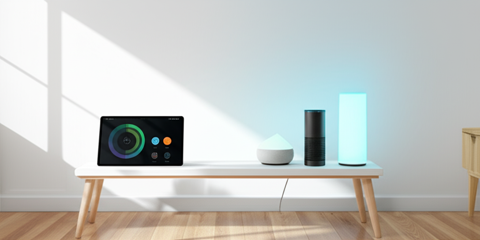
Living with AI: How Smart Assistants Are Changing Our Homes
Smart assistants are rapidly changing how we live in our homes. From controlling lights and thermostats to providing information and entertainment, these AI-powered devices offer convenience, efficiency, and a new level of home automation. This blog post will explore the impact of smart assistants on our homes and discuss their benefits and drawbacks.
Convenience and Automation: One of the most significant ways smart assistants improve our lives is through increased convenience and automation. Imagine waking up to a perfectly temperature-controlled room, with your favorite playlist already playing, all thanks to a pre-programmed smart assistant. These devices allow you to control various aspects of your home remotely, whether you're at work, on vacation, or simply in another room.
Home Security: Smart assistants enhance home security through integration with smart locks, security cameras, and alarm systems. They can provide alerts if a door or window is opened unexpectedly, or if motion is detected. This added layer of security offers peace of mind and helps to deter potential intruders. Voice-activated security features add an additional level of convenience, allowing you to arm or disarm your security system without fumbling with keys or keypads.
Energy Efficiency: Many smart assistants are designed to help conserve energy. They can learn your usage patterns and adjust your thermostat, lighting, and other appliances accordingly, resulting in lower energy bills and a smaller carbon footprint. Automated systems can also identify and fix energy inefficiencies, contributing to a more sustainable home environment.
Entertainment and Information: Beyond home control, smart assistants offer a wealth of entertainment and information. They can play your favorite music, podcasts, or audiobooks. They can answer questions, provide weather updates, set reminders, and even read news headlines. This integration of entertainment and information makes life easier and more enjoyable.
Accessibility and Inclusivity: Smart assistants offer significant advantages for individuals with disabilities. Voice control provides hands-free operation for those with mobility challenges. For individuals with visual impairments, the auditory feedback provided by these devices is invaluable. Smart assistants promote inclusivity by creating more accessible and user-friendly homes.
Concerns and Limitations: While the benefits are numerous, it's important to acknowledge some potential concerns. Privacy is a significant issue, as these devices constantly collect data about our habits and routines. It is crucial to understand the data collection practices of specific smart assistants and to take steps to protect your privacy. Furthermore, reliance on technology can sometimes lead to a lack of personal interaction and engagement. It's important to maintain a balance between using technology and engaging in meaningful human connections.
The Future of Smart Homes: The future of smart assistants and home automation looks promising. We can expect even greater levels of integration and sophistication, with improved artificial intelligence resulting in more intuitive and personalized experiences. The use of smart assistants will continue to evolve, bringing further convenience, efficiency, and security to our homes.
Conclusion: Smart assistants are transforming how we interact with our homes. They provide convenience, automation, security, and entertainment. However, it's important to be mindful of potential privacy issues and to maintain a balanced approach. As the technology continues to advance, the impact of smart assistants on our lives will undoubtedly grow.
Hashtags:#smarthome #AI #artificialintelligence #smartassistant #homeautomation #technology #convenience #efficiency #security #privacy Labels: smarthome,AI,artificialintelligence,smartassistant,homeautomation,technology,convenience,efficiency,security,privacy
No comments:
Post a Comment